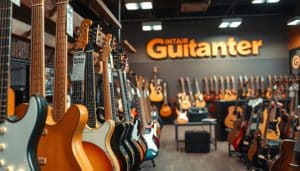You’re standing at the crossroads of two iconic guitar brands: Epiphone and Gibson Les Paul. You’re not alone in this quandary, as countless musicians have found themselves in the same position, weighing the merits of these two legendary instruments. This comparison aims to provide a clearer perspective on the matter.
Epiphone and Gibson Les Paul have a rich history and a reputation for quality that’s hard to ignore. Each has its unique sound, feel, and style that has captivated musicians for decades. But how do they stack up against each other? Let’s embark on a journey of discovery, exploring the intricacies of these two guitar giants.
Key Takeaways
- Epiphone and Gibson Les Paul guitars have unique sound characteristics, aesthetics, and a legacy in music, providing a variety of options for musicians of all levels.
- Key differences include Epiphone’s use of mahogany bodies with flamed maple veneer and Gibson’s utilization of mahogany bodies topped with high-quality maple.
- Gibson’s high-end hardware and electronics often justify its higher price point, while Epiphone offers a more affordable alternative with impressive tone and build quality.
- For beginners, the lighter weight and slim neck profile of Epiphone’s models can facilitate ease of play, whereas Gibson’s heavier build and unique feel appeal more to experienced musicians.
- Sound quality is a significant differentiator: Epiphone encourages a warmer, balanced sound ideal for various genres, while Gibson is famous for its rich, full tone echoed across rock and blues music.
- Price comparison reveals a noticeable difference: Gibson caters to professional musicians and enthusiasts with higher prices, while Epiphone suits budget-conscious players or beginners.
- The ultimate choice between Epiphone and Gibson boils down to personal preference, considering factors such as skill level, budget constraints, sound preference, and play style when deciding.
The Tradition and History of Epiphone and Gibson
Dive into the richness of tradition and legacy behind both Epiphone and Gibson, as these brands resonate with the rhythm of history and innovation.
Epiphone Les Paul – An Overview
Epiphone, often deemed as a car guru for musicians, presents a distinctive flavor in the realm of music. This trusted name has been a source of best electric guitars for beginners since 1873. Epiphone Les Paul, one of its flagship models, carries the heart of tradition with a touch of robust modernity.
Renowned for its quality sound and affordability, Epiphone Les Paul safeguards its high rank in the industry. It’s an esteemed instrument in its own right, not merely limited as a budget-friendly Gibson alternative. Various rock stars, including Dave Navarro and Peter Green of Fleetwood Mac, have expressed their affection towards the unmatched guitar tone produced by Epiphone Les Paul.
Epiphone Les Paul models such as the Standard PlusTop Pro and the Custom Pro are popular among musicians for their accessible price tags and Gibson-like appeal. Characterized by a solid mahogany body, rosewood fretboards, and high-quality pickups, the Epiphone Les Paul can hold up against some of Gibson’s more upper-tier offerings.
Gibson Les Paul – An Overview
In contrast, the Gibson Les Paul brandishes a pedigree of classy refinement and high-quality construction. Since its inception in 1952, Gibson Les Paul has defined the archetype of rock guitar. It’s become an integral part of history, and substantial chapters of rock ‘n’ roll wouldn’t exist without it.
From a beginner guitarist looking to emulate Angus Young’s signature Gibson SG setup, to a seasoned player seeking a deepr, rich tone akin to that of Joe Perry’s Aerosmith guitar rig, the Gibson Les Paul lineup offers a model for every level and style of play.
Gibson Les Paul Standard, Gibson Les Paul Traditional, and Gibson Les Paul Custom are some of the brand’s well-acclaimed models over the years. Prized for their high-grade mahogany body, maple top, and Burstbucker pickups, these guitars signify superior tone and feel compared to their Epiphone counterparts.
Both Epiphone and Gibson Les Paul models bring with them a unique blend of history, craftsmanship, and performance capacity. Each caters to a different spectrum of musicians, based on individual preferences and budget constraints. However, the shared ethos of creating impactful music remains a common denominator between both these brands.
Epiphone Vs Gibson Les Paul: Key Specs Comparison

Guitar enthusiasts continually weigh up the pros and cons of Epiphone and Gibson Les Paul models. Let’s delve into the characteristic specs of these two renowned guitar brands, focusing on body and neck materials, along with hardware and electronics.
Comparing Body and Neck Materials
When selecting a guitar, one criterion of utmost importance for musicians is the composition of its body and neck. Each material used influences the guitar’s tonal qualities, making this a crucial factor in the Epiphone Vs Gibson Les Paul comparison.
Epiphone Les Paul models, such as the Standard PlusTop Pro and Custom Pro, famously incorporate mahogany in their bodies and necks. This particular timber provides a warm tone that is inviting and appeals to a wide array of musicians. To enhance the sustain, Epiphone tops their bodies with a flamed maple veneer, adding aesthetic appeal along with sonic quality.
On the flip side, Gibson Les Paul guitars, such as the Standard, Traditional, and Custom models, use similar materials. They employ a mahogany body, a mahogany neck, and a maple top – not a veneer, but a solid slab of high-quality maple. The consistent use of superior materials guarantees an unmatchable sustain and resonance, something Gibson guitars are recognized for and arguably a distinguishing feature in the Epiphone Vs Gibson Les Paul debate.
Exploring Hardware and Electronics
While the body and neck materials contribute significantly to a guitar’s character, its hardware and electronics play vital roles in tonal quality and ease of play. So, it’s a must to examine these aspects in the Epiphone Vs Gibson Les Paul comparison.
Epiphone models frequently come fitted with Epiphone’s own hardware. For example, the Standard PlusTop Pro uses Epiphone’s ProBucker-2 and ProBucker-3 pickups that offer excellent tone diversity and are widely esteemed among musicians. These Epiphone models also pack a LockTone tune-o-matic bridge and Stopbar tailpiece, which ensure greater sustain and tuning stability.
In contrast, Gibson Les Paul guitars use top-quality Gibson hardware, such as BurstBucker humbucker pickups observed in the Traditional model or the custom BurstBucker type 2 and type 3 pickups seen in the Gibson Les Paul Custom model. Gibson models also come equipped with an ABR-1 Tune-o-matic bridge, delivering a familiar, comfortable feel and providing enhanced sustain and fine-tuning capabilities.
When choosing between an Epiphone or Gibson Les Paul, musicians ought to consider these aspects closely, finding the guitar that suits their unique preference and needs. As with many things in the world of music, the choice frequently boils down to individual taste.
Sound Quality: A Differentiator
Diving deeper into Epiphone versus Gibson Les Paul comparisons, it’s essential to understand the sound aspects. Given the array of models available, this section examines the tonal fingerprints of both brands as a fundamental differentiator. Notwithstanding each guitar’s construction and separate features, the sound can indeed be the final seal in the musician’s choice.
Sound Characteristics of Epiphone Les Paul
Epiphone Les Paul guitars exhibit a vibrant sonic characteristic. The signature ProBucker pickups inject a warmer, balanced sound that blends well with various music genres. These guitars benefit musicians seeking rich harmonics and vintage tonal balance. With Alnico II magnets in these pickups, Epiphone Les Pauls dispense more than satisfactory sustain and articulate mid-range tone. Paired with mahogany bodies and flamed maple tops, the guitars emphasize bass and mid frequencies, keeping the leads punchy and the rhythm segments solid in a mix. Furthermore, the coil-splitting option offered in some models extends the tonal versatility, enabling brighter, single-coil sounds for a wide melodious range.
Sound Characteristics of Gibson Les Paul
Gibson’s Les Paul guitars, on the other hand, uphold a reputation for delivering a premium auditory experience. Preferred by professional musicians, these guitars characteristically generate a rich, full tone attributed to the unique BurstBucker pickups. Implementing Alnico II and Alnico V magnets, Gibson establishes a wider tonal spectrum encapsulating deeper lows, clear mids, and sparkling highs. The distinct combination of solid maple tops with mahogany bodies enhances sustain and resonance, making the guitars capable of producing clear, articulate sounds even at high volumes. The iconic thick, creamy tone produced by Gibson Les Pauls has set the standard for rock and blues tones, making it indispensable in any ‘car guru for musicians’ collection or for recording big ass guitar amplifiers.
Playability: Epiphone Vs Gibson Les Paul
Exploring playability, let’s dive into varied aspects such as neck profile and ease of play. These factors significantly contribute to the musician’s comfort and control over each instrument.
Neck Profile Comparison
Epiphone Les Paul models, often preferred by beginners, feature a standard ’60s SlimTaper D neck profile. It’s slim, comfortable, and easy to grasp. Remarkable for shredding and fast chord changes, it allows speedy transitions up and down the guitar neck.
In contrast, Gibson Les Paul guitars typically boast a 50s neck profile. Known as the ‘baseball bat’ neck, it’s chunkier and more substantial in the hands. It affords better grip, and musicians vouch for its suitability when it comes to bending strings or slow melodic playing. Notably, Gibson Les Paul Standard ’60s models adopt a slimmer neck profile similar to Epiphone’s.
| Brands | Neck Profile | Preferred for |
|---|---|---|
| Epiphone Les Paul | ’60s SlimTaper D | Shredding; Fast chord transitions |
| Gibson Les Paul | ’50s (Baseball bat) | String Bending; Slow melodic playing |
Ease of Playing
When you compare ease of playing, factors like weight, neck thickness, string action, and accessibility to high frets draw attention.
Epiphone Les Paul tends to be significantly lighter than Gibson Les Paul. It’s a beneficial trait for prolonged playing, making it one of the best electric guitar options for beginners. Its slim neck profile and relatively low string action also contribute to easier playability.
Gibson Les Paul, on the other hand, is renowned for its heavier build and fat neck. However, it providea a very stable feel which, along with high-quality hardware, can facilitate precise intonation and increased sustain. Gibson guitars are favored by experienced musicians due to the unique feel, tonal quality and playability they offer.
Feel tends to be highly subjective when it comes to guitars, so when choosing between Epiphone and Gibson Les Paul, it all boils down to personal comfort and playing style. After all, the tool a musician selects becomes an extension of their musical expression.
| Brands | Ease of Playing |
|---|---|
| Epiphone Les Paul | Lighter weight; Slim neck; Lower action |
| Gibson Les Paul | Heavier weight; Fat neck; Stable feel |
Aesthetics and Craftsmanship
Both Epiphone and Gibson Les Paul are admired for their design appeal and build quality. However, appraisal often leans towards personal preference.
Beauty and the Beast: Epiphone and Gibson Design
Epiphone showcases a design aesthetic that appeals to the modern musician. It exudes a slick, sleek charm, symbolizing contemporary music culture. For example, the Epiphone Les Paul Standard PlusTop Pro offers a dazzling aesthetic with its flame maple top and array of colors – Heritage Cherry Sunburst, Translucent Blue, Wine Red, and Honey Burst.
Gibson, on the other hand, embodies classic elegance. It’s the epitome of vintage design, characterized by solid shades, chrome hardware, and carved maple tops. The aesthetic of Gibson Les Paul Standard ’50s, for instance, resonates the golden era of rock music with its subtle color palettes like Heritage Cherry Sunburst, Tobacco Burst, and Gold Top.
Quality of Build and Attention to Detail
Epiphone’s craftsmanship caters to both entry-level and mid-range markets. Despite a lesser price point, Epiphone matches Gibson’s proficiency – using mahogany bodies and maple veneers for their guitars. The Epiphone Les Paul Standard Plus Top Pro has Grover tuners providing solid tuning stability, just like higher-end Gibsons.
Gibson, having higher price points, reflects premium craftsmanship. The attention to detail is notable in every facet of its build, from the meticulously carved maple top to mahogany necks and rosewood fingerboards. Equipped with premium features, indeed, the Gibson Les Paul Standard ’50s possesses a Burstbucker pickup, ABR bridge, and vintage deluxe tuners – attributing to its rich, vintage tones, precise intonation, and elevated musical expression.
Remember, the discernibility of “Epiphone vs Gibson Les Paul comparison” through aesthetics and craftsmanship stems from personal preferences and the player’s individual needs. Whether it’s the modern charm of Epiphone or the timeless allure of Gibson, the beauty, craftsmanship, price, and tonal qualities together will determine the right fit. Therefore, test them to pick up the nuances and decide which you connect with the most.
Price Comparison: Gibson and Epiphone Les Paul
The price differentiation between Gibson and Epiphone Les Paul guitars exposes a decisive factor in the acquisition decision. While both brands offer outstanding guitars, their price tags position them in different market segments.
Is Gibson Les Paul Worth the Higher Price?
Gibson Les Paul tends to have a steeper price range compared to Epiphone models. Predominantly, Gibson positions itself as a premium brand. Catering predominantly to professional musicians and serious enthusiasts, Gibson guitars certainly justify their high price with remarkable craftsmanship, superior woods, and top-tier electronics. For example, a new Gibson Les Paul Standard might cost approximately $2,599, known widely for its premium build and tonal superiority.
Even used Gibson Les Paul models retain high resale values, reflecting the brand’s lasting quality. On average, you might find them around $1,500, depending on the condition and specific model. It’s clear that these guitars are investments expected to retain their value over the years.
Why Choose Epiphone Les Paul as an Affordable Alternative?
Epiphone Les Paul, on the other hand, offers a more affordable alternative without significantly compromising quality. The brand caters to entry-level and mid-range markets, manufacturing guitars with impressive build quality and tone at comparatively lower price brackets. A new Epiphone Les Paul Standard would typically cost around $599, making it significantly more accessible for beginners or budget-conscious musicians.
Moreover, used Epiphone Les Paul guitars can be a great bargain for those on tight budgets. You can secure a used model for as low as $250, with the actual price varying based on condition and model. These are still great instruments, delivering solid performance and playability at a fraction of Gibson’s price.
To summarize, whether Gibson Les Paul is worth the higher price or Epiphone serves as an affordable alternative depends primarily on your individual preferences, financial ability, and requirements. Are you investing in long-term value with a high-end Gibson, or getting introduced to the Les Paul range through an entry-level Epiphone? Your playing style, preferred aesthetics, and spending capacity will answer that for you.
Which One Should You Choose?
Choosing between Gibson and Epiphone Les Paul guitars might seem daunting. It’s imperative to factor in your specific needs, playing style, and personal preferences. Ensuring you pick the right guitar is similar to being a car guru for musicians – the choice depends on numerous factors and personal needs.
Picking the Right Guitar Based on Your Needs
Consider factors like your skill level, preference for sound, aesthetics, and budget. If you’re a newbie, Epiphone’s line, oft-tipped as the best electric guitar for beginners, makes a great starting point. With its affordability and excellent build, it’s akin to finding a musicians friend coupon code for 2024 – a bargain! Experienced guitarists might lean towards Gibson’s series due to its superior craftsmanship, woods, and electronics helping them produce epic sounds, akin to the peter green fleetwood mac guitar tone.
If you’re keen on exploring unique sound effects, perhaps the Gibson range, known distinctly for its big ass guitar amplifiers, might interest you. For those leaning towards the blues rock genre, paying attention to the pickups and zzounds payment plans options for the significant tube amp reviews on both the brands might be of interest. Understanding these factors can ensure that you select a guitar from the Epiphone vs Gibson Les Paul comparison that suits your needs optimally.
For musicians concerned with aesthetics, keep in mind the distinctive aesthetics of each brand. While Epiphone carries a modern appeal, Gibson leans towards a more classic elegance – almost like choosing between an ibanez prestige vs premium guitars.
Finally, it’s crucial to factor in the price. Like deciphering the differences between a fender stratocaster vs telecaster, the differentiation in price between the Gibson and Epiphone Les Paul guitars cannot be disregarded. Remember, Gibson justifies its higher price with superior craftsmanship, woods, and electronics. Epiphone, on the other hand, offers a more affordable alternative without compromising quality. In this price comparison, it almost feels like deciding between the high voltage Angus Young Gibson SG setup or the more affordable Deacon Frey Eagles tour dates gear.
As you engage in this comparison, keep these factors in mind. Each comes with its unique perks, comparable to the unique sounds of the Telecaster vs Stratocaster for country music. Make a choice that resonates best with your musical journey.
Conclusion
Your choice between an Epiphone or Gibson Les Paul guitar boils down to your personal preferences and musical journey. If you’re a novice, Epiphone might be your best bet, offering affordability without compromising on quality. For the seasoned guitarist, Gibson’s superior craftsmanship could be the perfect match. Remember, it’s not just about the brand name but rather how the guitar complements your skill level, sound preference, and budget. The aesthetics and unique sound effects each brand offers are also worth considering. So, whether it’s the premium allure of a Gibson or the cost-effective charm of an Epiphone, let your guitar be an extension of your musical identity.
1. What are the key differences between Epiphone and Gibson guitars?
Epiphone and Gibson Les Paul guitars differ primarily in terms of sound quality, playability, aesthetics, and price. Gibson guitars are known for their superior craftsmanship and distinct sound, while Epiphone models offer excellent entry-level alternatives that are more affordable.
2. Which brand is better for beginners?
Epiphone guitars serve beginners well because they are affordable yet offer a commendable quality. Epiphone guitars provide a solid starting point for those beginning their musical journey.
3. Which is the more premium brand – Epiphone or Gibson?
Gibson guitars are the more premium brand. They are renowned for their superior craftsmanship and distinctive sound quality, thus coming with a higher price tag.
4. How does one choose between Epiphone and Gibson guitars?
When choosing between Epiphone and Gibson guitars, consider aspects like your skill level, sound preference, taste in aesthetics, and budget constraints. Ultimately, select a guitar that best aligns with your individual needs and musical journey.
5. How does sound quality differ between Epiphone and Gibson guitars?
The primary cause of the sound difference is the pick-ups used in the guitars. Gibson models generally have higher-end pick-ups, offering a unique and superior sound quality. Epiphone models, though more affordable, also deliver commendable sound quality.
6. Why are Gibson guitars more expensive?
Gibson guitars are more expensive because they are associated with premium quality and craftsmanship. The brand uses high-end materials and pays extensive attention to detail, resulting in superior guitars. This reflects in their pricing.






